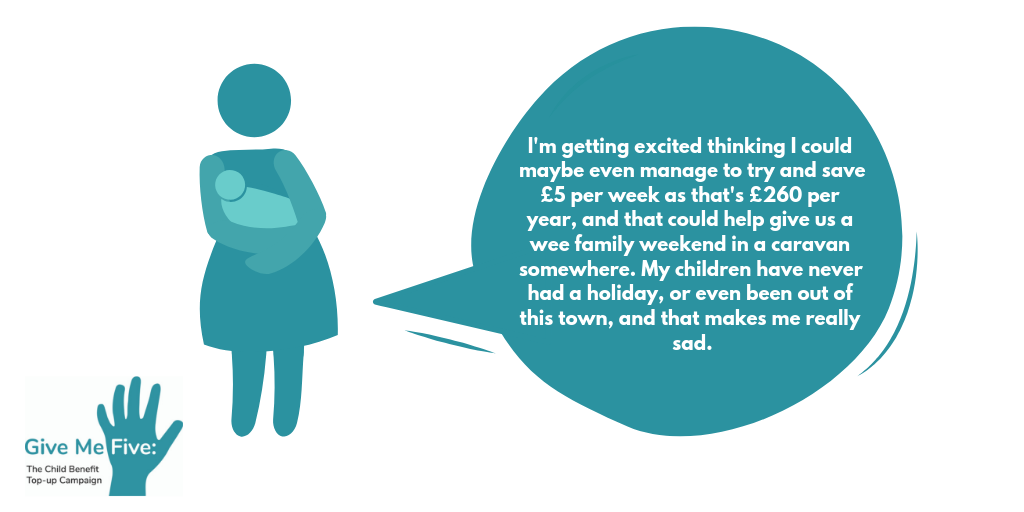In a just and compassionate society like Scotland, every child should be given the opportunity to participate fully in society. Currently, however, 240,000 Scottish children are trapped in poverty.
As a society we have a moral duty to change this.
In Scotland we have the power to lift tens of thousands of children out of poverty by simply topping up child benefit by just £5 a week per child. This is what the Give Me Five campaign is calling for.
The Scottish Government has committed to introducing a new income supplement for families on low incomes by 2022 – this is not soon enough for families living in the grip of poverty.
For families on low incomes it is a daily struggle. They must make difficult choices between paying bills or putting dinner on the table. One parent told us that £5 extra a week would allow her to buy fresh fruit and not rely on foodbanks as much. Others talked about how it could go towards paying for activities like swimming or buying new school shoes.
Right now, the Scottish Government has the power to introduce a top up to child benefit. Child Benefit claims are simple and available to everyone, meaning no one slips through the cracks. Topping up child benefit by as little as £5 could improve the lives of families across the country.
Whilst all families with children would benefit from a top up to Child Benefit, the Give Me Five campaign is particularly important for women.
Women are shouldering the burden of poverty in the UK. Since 2010, 86% of the cuts to social security and tax credits have come from women’s incomes[1].
In the UK, nine in ten single parents are women and often caring responsibilities restrict their ability to take up full-time, well paid employment. As a result, they rely more on social security and are more impacted by changes to it than men.
Particularly harmful to women is Universal Credit. It has the potential to further entrap them in poverty. This is because the payment is made to the highest earner in a one-off payment, which in many households is the man[2].
Women are also disproportionately affected by the two-child limit. For any third child born after April 2017, women cannot – except for in limited exception – claim child tax credit or the child element in Universal Credit[3].
Unlike Universal Credit, child benefit is available to every child. It could be a life-line for single mothers struggling to stay afloat.
Families in Scotland are being suffocated by poverty – they can’t wait until 2022 for a new income supplement. The Scottish Government needs to act now to stop families sinking deeper into poverty.
Rebecca Menzies
[1] https://www.engender.org.uk/content/publications/Securing-Womens-Futures—using-Scotlands-new-social-security-powers-to-close-the-gender-equality-gap.pdf
[2] https://wbg.org.uk/blog/gender-neutral-universal-credit-equality-impact-assessments/
[3] https://sp-bpr-en-prod-cdnep.azureedge.net/published/2019/4/9/Child-poverty-in-Scotland–forecasting-the-impact-of-policy-options/SB%2019-18.pdf


Enter your email address to receive regular e-updates about our work. If at any time you want to stop receiving these, simply contact us. We’ll keep your details safe and won’t share them with any other organisations for their marketing purposes. For full details see our Privacy Policy.